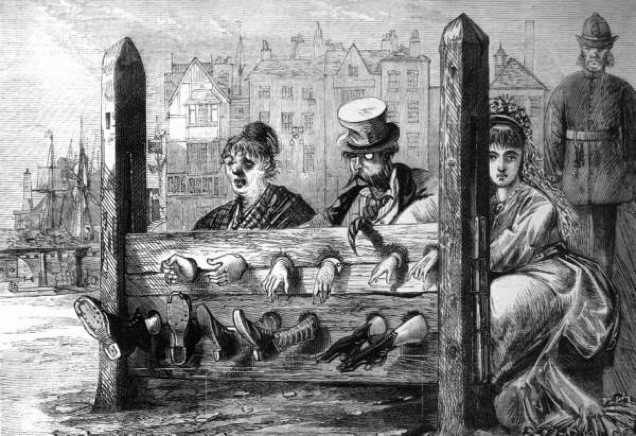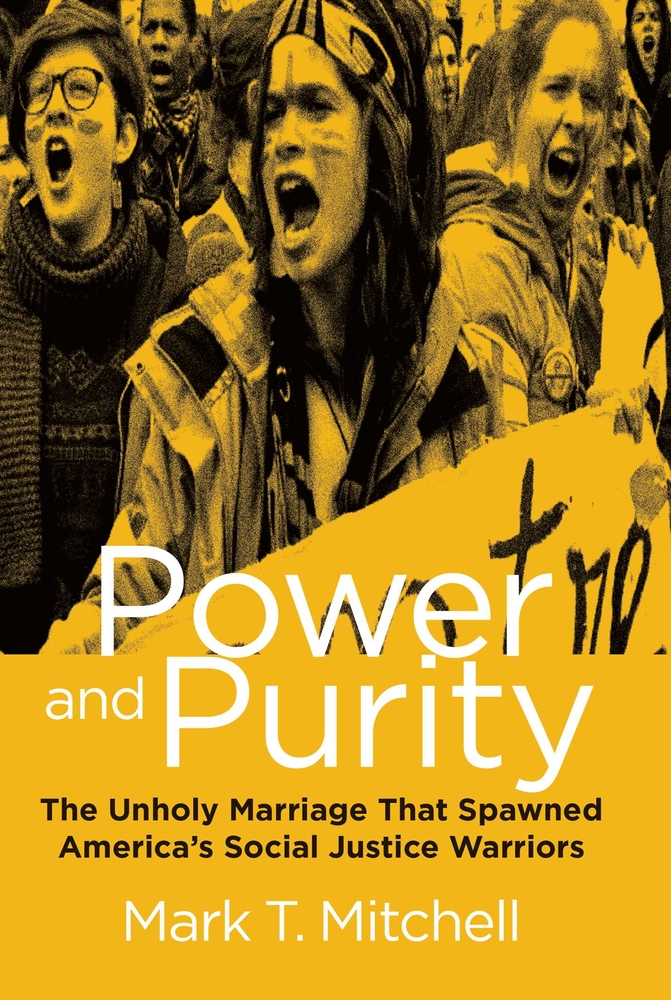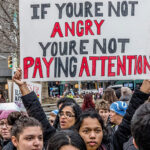Donny: Are these the Nazis, Walter?
Walter Sobchak: No Donny, these men are nihilists. There’s nothing to be afraid of.
—The Big Lebowski
Eureka, IL. In The Big Lebowski, Walter Sobchak initially presumes that the Germans menacing his eponymous friend are Nazis, on account of their ethnicity and extremism (they have threatened to cut off the Dude’s “Johnson”). To Walter’s dismay, he learns that they are nihilists. “I mean,” Walter muses aloud, “say what you want about the tenets of National Socialism, Dude, at least it’s an ethos.” As it turns out, nihilists in America today do have an ethos, and there is something to be afraid of.
That argument is put forward in Mark Mitchell’s Power and Purity: The Unholy Marriage that Spawned America’s Social Justice Warriors, a laconic and stimulating work that merits a wide readership. As Mitchell characterizes it, ours is an “age of Nietzschean Puritanism” (104), which, eschewing proper adjectives, might translate as nihilistic moral absolutism. The spawns of that union should need no introduction, as they have been running amok across college campuses for some time now, loudly airing their grievances and tirelessly (and tiresomely) railing against the perennial inequities and iniquities of life. As for the partners themselves, the elder is no one person, but really a group of people and more to the point, the ideas and ideals its members carried with them; those “pious adventurers,” as Tocqueville referred to the Puritans, who sailed to Plymouth in 1620 to “make an idea triumph” and in so doing shaped the destiny of America. Stating a truism that is liable to offend, not because it is incorrect, but because it is politically so, Mitchell writes that “we have inherited habits, ideas, and institutions deeply influenced by our Puritan past… [and] more broadly, America continues to be profoundly shaped by its Christian heritage” (8). As for the other half (I hesitate to say better), Nietzsche was a nineteenth-century German philosopher who is perhaps best known for heralding the death of God and whose influence on America has been prodigious, profound, and not always apparent (pun intended). (Mitchell provides, in this very brief book, a very concise and fine biographical sketch of the man who declared war on Christianity and lost his mind in the process of waging it.)
It is a curious coupling, one that its partners are not likely to have consented to. Certainly no Puritan would sanction so unholy a union, and if Nietzsche would have approved, his motivation for doing so would have been insidious (for reasons that will be touched upon below). What renders it more curious still is that the progeny themselves are likely to be largely if not altogether unaware of their progenitors. Though in an age that disdains the past and discounts the power of ideas (“Ideas matter,” Mitchell feels obliged to remind his readers (10)), their ignorance on this score should come as little surprise.
Puritanism receives short shrift in this short work. It is not clear that this is a failing of it, but the imbalance is difficult to overlook. (Even when matters that are central to Puritanism are taken up —the Bible, for instance—they tend to be taken up from Nietzsche’s perspective.) Perhaps the assumption is that the Christian stamp on America’s character is so pronounced and indelible that it need only be treated cursorily here. Whatever the case may be, Mitchell leaves no doubt that Puritanism is integral to the nominally liberal mindset that he lays bare.
Today’s social justice warriors are morally puritanical, “motivated by a quest for moral and political purity” (12) that is indicative of their god-fearing forebears. But unlike their forebears, they are godless. As a result, they lack some of the saving graces of their antecedents, not the least of which is the humility that comes with the awareness that we are all flawed or, to speak more like a Puritan, that we are all sinners. In the minds of the woke, it is the system, the patriarchy, the man (white, straight, and cisgendered, no doubt)—call it what you will—that is flawed; the woke are merely innocent victims, who, had they control, would right the wrongs that riddle their age and rid the world of them (and, if history is anything to go by, those held responsible for perpetuating them as well). What the woke also lack is moral and intellectual honesty or consistency, owing to the corrupting—or enlightening, depending on one’s view—influence of their unholy father. But what they lack in honesty, they more than make up for with certitude.
Thus, for example, that elemental quandary that bedeviled Socrates and his companions one wakeful night in the Piraeus some two and a half millennia ago is no longer open to question. If nothing else, the woke know what justice is. But it turns out they know many things—the very things of which Socrates professed, and his interlocutors often proved, to be ignorant. As Mitchell rightly notes, it is not moral relativism that they display but “supreme moral confidence” (35). That confidence is reflected in the dogmatism and often fanaticism with which they espouse any number of positions on matters that ought to invite a good deal of skepticism and leave ample room for debate. It is also reflected in their aversion to debate. When you know you are right and your opponents wrong—and not just (or at all) factually wrong, but morally so—why debate them? Better to cancel, deplatform, silence them—forcefully, if need be.
Which brings us to the other half. What the woke inherit from Nietzsche is force; or rather, an understanding of the part that power plays in human interactions. Nietzsche posited that the fundamental drive of all life is will to power, which might better be understood as the will to overpower. Life is a struggle not for survival or existence (as Darwinists would have it), but for power; a struggle that manifests itself not simply on the plains of the Serengeti but in less overtly brutish matters such as religion, philosophy, and morality.
“If power lies at the heart of all human affairs” (35), then appeals to truth, reason, forbearance, and so forth are themselves nothing more than power grabs, mendaciously and—for a long time—efficaciously garbed. But that time has past. The woke have awoken; the jig is up. Hence their penchant for protesting and their want of compunction about doing so violently. In the struggle for power, intimidation is more effective than persuasion.
But it is a struggle without rhyme or reason. Life has no teleology and history no directionality. We are but ephemeral beings of chance aimlessly adrift in a cosmic void hemmed in by eternities that have known and will know nothing of us. However, this part of Nietzsche’s teaching the woke have studiously and conveniently neglected, which helps to explain their moral and intellectual dishonesty.
As Dostoevsky’s Ivan Karamazov inferred, if God is dead, everything is permitted. And lo and behold, Nietzsche informs us, God is dead. But, it turns out, at least in the sanctimonious minds of the woke, everything is not permitted. Perhaps nothing illustrates the absurdity of the social justice warrior’s ethos more effectively (and comically) than the safe spaces that they routinely demand, where, instead of everything being permitted, very little is permitted, lest the occupants of those spaces be discomfited. God is dead. Life is will to power. Do no harm. The syllogistic ratiocinations of a social justice warrior.
Mitchell astutely observes that “the demand for safe spaces and ‘trigger warnings’—by which certain ideas and books are quarantined—is a sign of emotional and mental fragility” (114). Nietzsche no doubt would agree. Long before such spaces and warnings existed, Nietzsche claimed that
we moderns, with our thickly padded humanity, which at all costs wants to avoid bumping into a stone, would have provided Cesare Borgia’s contemporaries with a comedy at which they could have laughed themselves to death. Indeed, we are unwittingly funny beyond all measure with our modern “virtues.” (Twilight of the Idols, “Skirmishes of an Untimely Man” #37)
But the risibility of those virtues did not blind Nietzsche to their danger. Modern virtues, which the woke at once emblematize and bastardize, are inimical to life understood as will to power. Those virtues prioritize fragility over fortitude and aim to do away with the very conditions that life requires to flourish and advance. We may lament the emotional and mental fragility of the woke, but they are children of modernity, not its negation, to say nothing of its transcendence. Their longing is consistent with the modern longing, itself an outgrowth of the Christian longing, for a world without suffering.
Whoever examines the conscience of the European today will have to pull the same imperative out of a thousand moral folds and hideouts—the imperative of herd timidity: “we want that some day there should be nothing any more to be afraid of!” Some day—throughout Europe, the will and way to this day is now called “progress.” (Beyond Good and Evil #201)
In this regard, and in spite of the tenor of Mitchell’s book, there may be more Puritan than Nietzsche in today’s social justice warrior.
It is a point that bears stressing that the fractious multitudes menacing the West are of the West’s own making and that in combatting them, those who would seek to defend the West must combat something of themselves, of their shared heritage. That is what Nietzsche calls for. Nietzsche did not create the nihilists at and within our gates, though he did welcome them; nor, for that matter, did he kill God. We—who live off the fruits of that heritage—did, even if we fail to acknowledge as much. What Nietzsche meant by the death of God is that, as Mitchell puts it, “the idea of God [is] no longer plausible” (21). What renders that idea untenable is what we know, or accept to be true, about ourselves and the ever-expanding universe into which we find ourselves thrown. Case in point: according to one of those verities, one that Nietzsche himself qualified as true but deadly, there is no “cardinal distinction between man and animal” (On the Uses and Disadvantages of History for Life). How can that truth be reconciled with “faith in the dignity and uniqueness of man, in his irreplaceability in the great chain of being?” (On the Genealogy of Morals, Third Essay #25). Nietzsche’s answer is, so long as we are being honest, it can’t. Once the earth has been unchained from the sun (The Gay Science #125), the value of man cannot be sustained—unless a new horizon is discovered (or given), which is precisely what Nietzsche set out to do.
Presumably no book is immune from criticism and in this regard, Mitchell’s proves no exception. An obvious, and to my mind, superficial criticism is that the book commits a sin of omission by disingenuously ignoring the sins of the right. Wrongdoing is part and parcel of politics and human nature more deeply, and Mitchell never intimates otherwise. “No faction has a monopoly on extremism” (4). But wokeness appears to be a phenomenon that is unique to the left. There is, to my knowledge, no corresponding social justice army on the right. Moreover and more importantly, the scattered remnants who would aspire to this status enjoy no legitimacy. The same cannot be said of the legions to the left, which retain unwavering support, from an academy that gives them strength by nurturing their grievances to a media that gives them cover by condoning their misconduct. When protestors menacing authorities are right-leaning libertarians—as we saw in Michigan’s capitol during the COIVD-19 lockdowns—and not leftist agitators, the media’s narrative is diametrically different. One would have to be assiduously unawake to contend otherwise.
A more substantive criticism, alluded to above, can be fleshed out by considering a question Mitchell demurs to answer. “Why would Nietzsche himself write books that seek to alert his readers to the creeping malady of Western society? Isn’t that an act of altruism and generosity rather than an assertion of power?” (116). An answer to that question is decisive not only for understanding what Nietzsche was after but what he meant by power.
Yes, Nietzsche was critical of Plato and the tradition he engendered, including (and especially) Platonism for the people (i.e., Christianity), but he was not oblivious to the peerless wonders that had been born from it. By virtue of it, the human animal has become much more interesting, the human soul much more profound. The problem, in Nietzsche’s mind, is that that tradition has run its course. It has become nihilistic—its “highest values devalue themselves” (Will to Power #2). New values are needed; new goals are needed. But that does not entail that the past two and a half millennia should be dispensed with. A tradition that boasts Homer, Shakespeare, Goethe, Montaigne, Mozart, Aristophanes, da Vinci, Spinoza, Beethoven, Heine, and Plato (yes, Plato), to name but a few of the civilizational titans whom Nietzsche esteemed, has a good deal to celebrate. There is much in Western Civilization that is worth preserving, including the very wellsprings of it, as evinced by Nietzsche’s extraordinary image of the overman: “the Roman Caesar with the soul of Christ” (Will to Power #983).
That image should help dispel the conceit that Nietzsche’s teaching on the will to power amounts to nothing more than an exaltation of brute force, a conceit that Mitchell at times appears to peddle. In what seems a very injudicious aside, Mitchell suggests that in Nietzschean terms, there is nothing wrong with rape (86). To be fair, that conclusion could be drawn from Nietzsche’s thought. If the Nazis could appropriate Nietzsche for their genocidal ambitions, a rapist presumably can do so for his predatory ones. With some unease, one might exonerate Nietzsche on the grounds that such conclusions follow from that deadly truth that we are but animals. In the animal kingdom, there is nothing wrong with rape; indeed, in that earthly kingdom, there are no wrongs. When a female mantis devours her partner after copulation, she has committed no injustice. Unfortunately for the beleaguered males of that order, in the natural world, there are no crimes of humantis.
But such ghastly meditations aside, a more sensitive reading of Nietzsche reveals that not all wills to power are equal. A person who takes a life is not necessarily more powerful than a person who spares one. A mob that tears down a civilization isn’t more powerful than the genius who founds one. The Athenians who condemned Socrates deprived him of his life, but ultimately, it was his will, not theirs, that proved triumphant.
Why would Nietzsche alert his readers to the creeping malady that afflicts the West? Because he fathomed, as deeply as anyone, the grandeur that inhered within it; but he also descried, again as well as anyone, the rot that coursed through that civilization, a rot reflected in the leveling and nihilistic inclination to discredit all grandeur. One need not be a Nietzschean to recognize that something is rotten in the states of America and in the West more broadly. It was Nietzsche’s view that the civilization could not be saved, even if pieces of it could be salvaged. The rot had run too deep and spread too far. It is in this regard, to make good on an earlier parenthetical, that Nietzsche might have welcomed the unholy union. The spawns of that union do Nietzsche’s bidding by laboring indefatigably to undo the civilization that has reared them. Their destruction sets the stage for a new creation: “If a temple is to be erected a temple must be destroyed—that is the law” (On the Genealogy of Morals, Second Essay, #24). In the end, social justice warriors may be little more than Nietzsche’s useful idiots.
There is much horror to be gleaned in Nietzsche’s philosophy, horror that is difficult to ignore and that Nietzsche himself, as Mitchell notes, struggled to overcome. (A few years before madness overcame him, Nietzsche wrote to a friend, “For me my life now consists in the wish that all things may be different from how I grasp them; and that someone would make my ‘truths’ unbelievable to me” (to Franz Overbeck, July 2, 1885).) One need not accept Nietzsche’s prescription to take his diagnoses seriously. Mitchell is to be commended for doing just that. In probing the soul and soullessness of Nietzsche’s Puritan warriors, he shows that their nihilistic pieties are “doomed to intellectual incoherence and must be a source of perpetual frustration and social unrest” (137). Power and Purity is an original and invaluable read. Many stand to profit from its perusal, particularly those who would rather see the temple preserved than destroyed.








2 comments
Leroy See
It’s been many years but it seems to me that “woksters” fit the model of those Nietzsche accused of espousing a transvaluation of values. What those in power preach to the masses is humility and passivity while those in power got there and stay there by being just the opposite. In other words, what they say isn’t what they do as evidenced by “woksters” being totalitarian absolutists demanding fealty in the name of social justice and equality.
To “woksters” God is indeed dead but has been replaced by the self as arbiter of the good and bad of the moment. “Wokster” purity of though and action is the litmus test of belonging to the group. Ostracism is one of the milder forms of
punishment for deviant thoughts and actions. Physical annihilation is one of the severe and often sanctioned punishments.
Once God is Dead as Nietzsche proclaimed no moral absolute exists except that as created by those with enough power to enforce it. The more that the aforementioned power to enforce is resisted the more vicious the punishment for deviation in thought and action. “Woksters” espousing love and equality are an egregious example of self-centered tyrannical aspirations to absolute power.
A re-reading of Nietzsche is indeed in order in today’s ideological and political battleground before all hard cover books are banned in favor of digital words and language whose existence and essence is easily “cancelled.”
Rob G
As you undoubtedly know, there has long been a belief among certain historians of ideas that progressivism is basically Puritanism minus the God stuff. Since wokesterism seems to be a sort of progressivism on steroids, the Puritan connection makes sense.
Another touchpoint that some have noticed, mainly those of us who grew up under its auspices, is the similarity between SJW-ism and Christian fundamentalism. The parallels are there and they are strong, although I don’t detect any sort of direct lineage between the two. It’s more likely that since all religious fundamentalisms share many of the same features, SJW-ism, despite being technically “godless,” functions as a religion for the woke, and thereby has developed certain fundamentalist features.
I’ve been waiting for someone to explore this in print, going as far as to encourage a political science-educated friend who also sees the parallels to write something on it. Time will tell whether he takes me up on the suggestion.
Comments are closed.